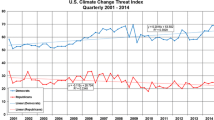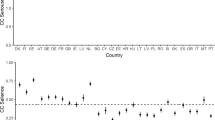Abstract
This paper conducts an empirical analysis of the factors affecting U.S. public concern about the threat of climate change between January 2002 and December 2010. Utilizing Stimson’s method of constructing aggregate opinion measures, data from 74 separate surveys over a 9-year period are used to construct quarterly measures of public concern over global climate change. We examine five factors that should account for changes in levels of concern: 1) extreme weather events, 2) public access to accurate scientific information, 3) media coverage, 4) elite cues, and 5) movement/countermovement advocacy. A time-series analysis indicates that elite cues and structural economic factors have the largest effect on the level of public concern about climate change. While media coverage exerts an important influence, this coverage is itself largely a function of elite cues and economic factors. Weather extremes have no effect on aggregate public opinion. Promulgation of scientific information to the public on climate change has a minimal effect. The implication would seem to be that information-based science advocacy has had only a minor effect on public concern, while political mobilization by elites and advocacy groups is critical in influencing climate change concern.


Similar content being viewed by others
Notes
For example, see the debate between Jon Krosnick based on his NY Times Op-Ed (NY Times June 8, 2010) and the critique provided by the Editor in Chief of Gallup, Frank Newport, in the blog posting of June 10, 2010 (online at http://pollingmatters.gallup.com/2010/06/reflections-on-jon-krosnicks-global.html—accessed 4/19/2011.
See the work of Krosnick (http://woods.stanford.edu/research/surveys.html) and the Six Americas Project at the George Mason University Center for Climate Change Communication: http://www.climatechangecommunication.org/images/files/Six_Americas_June_2010percent281percent29.pdf
The specific questions used in the analysis, dates administered, and surveying organization, and the data used in the analysis are provided in Supplementary Material online. All of the surveys utilized in the calculation of the CCTI were national samples.
A complete listing of the survey marginal scores, date of administration, and sample size are provided in the Supplementary Material, Table S1.
The WCALC program is available online at http://www.unc.edu/~jstimson/ .
Specific details about the variables, key words used in searches, specific magazines used in different categories, and the full data used in the analysis is provided in the Supplementary Material.
We also constructed a measure of major landfalling hurricanes in the U.S. based on data from the Center for Research on the Epidemiology of Disasters (CRED) data set (www.credd.be/). However, it produced negative effects and was collinear with the other weather extremes measures, so we do not show it.
In order to test for the possibility of effects carrying over from one quarter to another, we ran our regression results including the lagged CCTI as an independent variable. In all cases, this procedure resulted in non-significance for all of the independent variables. This is in line with the analysis conducted by Achen (2001). He argues that the addition of a lagged dependent variable (LDV) can inaccurately degrade the effects of the other variables when serial correlation and trending exist in the exogenous variable (as is the case here). Keele and Kelly (2005) further note that if the process is considered to be stationary, the addition of the LDV will bias the analyses. Both the Phillips-Perron and Dickey-Fuller unit root tests showed that the dependent variable is stationary. Since the statistical literature argues against the inclusion of a LDV when the underlying data is stationary and serial correlation is present we only show models without the LDV as they will provide the most statistically accurate estimates.
References
Achen C (2001) Why lagged dependent variables can suppress the explanatory power of other independent variables. Paper presented at the Annual meeting of the Political Methodology Section of the American Political Science Association, 2000
Agnone J (2007) Amplifying public opinion: the policy impact of the U.S. environmental movement. Soc Forces 85(4):1593–1620
Andrews K, Caren N (2010) Making the news: movement organizations, media attention, and the public agenda. Am Sociol Rev 75(6):841–866
Atkinson M, Baumgartner F, Coggins K, Stimson J (2011) Mood and agendas: developing policy-specific conceptions of mood. Paper presented at the Annual Meetings of the Midwest Political Science Association, Chicago IL. March 31, 2011
Bauer M, Allum N, Miller S (2007) What can we learn from 25-years of PUS research? Liberating and expanding the agenda. Public Underst Sci 16:79–95
Best S (1999) The sampling problem in measuring policy mood: an alternative solution. J Polit 61(3):721–740
Bolsen T, Cook F (2008) The polls-trends: public opinion on energy policy: 1974–2006. Public Opin Quart 72(2):364–388
Bord RJ, O’Connor RE, Fisher (2000) A. In what sense does the public need to understand global climate change? Public Underst Sci 9:199–212
Borick C, Rabe B (2010) A reason to believe; examining the factors that determine individual views on global warming. Soc Sci Q 91(3):777–800
Brewer PR, Pease A (2008) Federal climate politics in the United States: polarization and paralysis. In: Compston H, Bailey I (eds) Turning down the heat: the politics of climate policy in affluent democracies. Palgrave Macmillan, New York, pp 85–103
Brick P, McGreggor Cawley R (2008) Producing political climate change; the hidden life of U.S. environmentalism. Environ Polit 17(2):200–218
Darmofal D (2009) Elite cues and citizen disagreement with expert opinion. Polit Res Quart 58(3):381–395
Dumitrescu D, Mughan A (2010) Mass media and democratic politics. In: Leicht KT, Craig Jenkins J (eds) The handbook of politics: state and civil society in global perspective. Springer Publishers, New York, pp 477–491
Enns PK, Kellstedt P (2008) Policy mood and political sophistication: why everybody moves mood. British J Polit Sci 38:433–454
Erikson, Mackuen RM, Stimson J (2002) The Macro Polity, Cambridge.
Gamson W, Wolfsfeld G (1993) Movements and media as interacting systems. Ann Am Acad Polit Soc Sci 528:114–125
Gamson WA, Croteau D, Hoynes W, Sasson T (1992) Media images and the social construction of reality. Annu Rev Sociol 18:373–393
Gelpi C, Feaver P, Reifler J (2009) Paying the human costs of war: American public opinion and casualties in military conflicts. Princeton University Press, Princeton
Gleason K, Lawrimore J, Levinson D, Karl T, Karoly D (2008) A revised U.S. climate extremes index. J Clim 21:2124–2137
Greenberg J, Knight G, Westersund E (2011) Spinning climate change: corporate and NGO public relations strategies in Canada and the United States. Int Commun Gaz 73(1–2):65–82
Habermas J (1989) The public sphere: an encyclopedia article. In: Bronner E, Kellner D (eds) Critical theory and society. Routledge, New York, pp 102–107
Hamilton L (2010) Education, politics and opinions about climate change evidence for interaction effects. Clim Chang 104(2):379–422
Hindman DB (2009) Mass media flow and differential distribution of politically disputed beliefs: the belief gap hypothesis. Journal Mass Commun Quart 86(4):790–808
Kahn ME, Kotchen MJ (2010) Environmental concern and the business cycle: the chilling effect of recession. NBER Working Paper No. 16241, issued July 2010.
Keele L, Kelly N (2005) Dynamic models for dynamic theories: the ins and outs of lagged dependent variables. Political Analysis 14(2):186–205
Kellstedt PM (2003) The mass media and the dynamics of American racial attitudes. Cambridge
Kellstedt, Zahran PS, Vedlitz A (2008) Personal efficacy, the information environment, and attitudes toward global warming and climate change in the United States. Risk Anal 28(1):113–126
Koopmans R (2004) Movements and media: selection processes and evolutionary dynamics in the public sphere. Theory Soc 33:367–391
Krosnick J, Holbrook A, Lowe L, Visser P (2008) The origins and consequences of democratic citizens’ policy agendas: a study of popular concern about global warming, Climatic Change Spring
Lenz G (2009) Learning and opinion change, not priming; reconsidering the priming hypothesis. Am J Polit Sci 53(4):821–837
Lowry W (2008) Disentangling energy policy from environmental policy. Soc Sci Q 89(5):1195–1211
Luke T (2005) The death of environmentalism or the advent of public ecology? Organ Environ 18:489–494
MacKuen M (1981) Social communication and the mass policy agenda. In: Mackuen MB, Coombs SL (eds) More than news; media power in public affairs. Sage, Beverly hills, pp 19–144
Malka A, Krosnick J, Langer G (2009) The association of knowledge with concern about global warming; trusted information sources shape public thinking. Risk Anal 29(5):633–647
Marquart-Pyatt SR, Shwom T, Dietz R, Dunlap S, Kaplowitz AMcCright, Zahran S (2011) Understanding public opinion on climate change: a call for research. Environment 53(4):38–42
Mazur A (1998) Global environmental change in the news: 1987-90 vs. 1992–1996. Int Sociol 13:457–472
Mazur A (2009) American generation of environmental warnings: avian influenza and global warming. Human Ecol Rev 16(1):17–26
Mazur A, Lee J (1993) Sounding the global alarm: environmental issues in the U.S. national news. Soc Stud Sci 23:681–720
McCombs M (2004) Setting the agenda: the mass media and public opinion. Polity, Malden
McCright A, Dunlap R (2011) The politicization of climate change and polarization in the American public’s views of global warming, 2001–2010. Sociol Q 52(2):155–194
McDonald S (2009) Changing climate, changing minds; applying the literature on media effects, public opinion, and the issue-attention cycle to increase public understanding of climate change. Int J Sustain Commun 4:45–63
Oreskes N, Conway E (2010) Merchants of doubt. Bloomsbury Press, New York
Orr D (2005) Death and resurrection: the future of environmentalism. Conserv Biol 19:992–995
Pfau M, Haigh M, Sims J, Wigley S (2007) The influence of corporate front-group stealth campaigns. Commun Res 34(1):73–99
Pidgeon N, Fischoff B (2011) The role of social and decision sciences in communicating uncertain climate risks. Nat Clim Change 1:35–41
Pooley E (2010) The climate war: true believers, power brokers, and the fight to save the earth. Hyperion Press, NewYork
Reynolds T, Bostrom A, Read D, Granger Morgan M (2010) Now what do people know about global climate change? survey sudies of educated laypeople. Risk Anal 80(10):1520–1538
Sampei Y, Aoyagi-Usui M (2008) Mass-media coverage, its influence on public awareness of climate-change issues, and implications for Japan’s national campaign to reduce greenhouse gas emissions. Glob Environ Chang 19:203–212
Shipan C, Lowry W (2001) Environmental policy and party divergence in congress. Polit Res Quart 54(2):245–263
Smith G (2010) Politicians and the news media; how elite attacks influence perceptions of media bias. Int J Press/Polit 15:319–343
Spence A, Poortinga W, Butler C, Pidgeon N (2011) Perceptions of climate change and willingness to save energy related to flood experience. Nat Clim Change 1:46–49
Sterman J (2011) Communicating climate change risks in a skeptical world. Clim Chang 108:811–826
Stimson JA (1999) Public opinion in America; moods, cycles and swings, 2nd edn. Westview Press, Boulder Co
Stimson JA (2004) Tides of consent: how public opinion shapes American politics. Cambridge University Press, NY
Strömbäch J, Kiousis S (2011) Political public relations: principles and applications. Routledge Press, New York
Wanta W, Hu Yu (1994) Time-lag differences in the agenda setting process; an examination of five news media. Int J Public Opin Res 6:225–240
Watt JH, Mazza M, Snyder L (1993) Agenda-setting effects of television news coverage and the effects decay curve. Commun Res 20:408–435
Weber E (2011) Climate change hits home. Nat Clim Change 1:25–26
Weber E, Stern P (2011) Public understanding of climate change in the United States. Am Psychol 66(4):315–328
Yin J (1999) Elite Opinion and Media Diffusion: Exploring Environmental Attitudes. Harvard Int J Press/Polit 4(3):62–86
Zaller JR (1992) The nature and origins of mass opinion. University Press, New York: Cambridge
Zhao X (2009) Media use and global warming perceptions: a snapshot of the reinforcing spirals. Commun Res 36:698–723
Zhao X, Leiserowitz A, Maibach E, Roser-Renouf C (2011) Attention to science/environment news positively predicts and attention to political news negatively predicts global warming risk perceptions and policy support. J Commun. (in press)
Author information
Authors and Affiliations
Corresponding author
Electronic supplementary material
Below is the link to the electronic supplementary material.
ESM 1
(DOCX 77 kb)
Rights and permissions
About this article
Cite this article
Brulle, R.J., Carmichael, J. & Jenkins, J.C. Shifting public opinion on climate change: an empirical assessment of factors influencing concern over climate change in the U.S., 2002–2010. Climatic Change 114, 169–188 (2012). https://doi.org/10.1007/s10584-012-0403-y
Received:
Accepted:
Published:
Issue Date:
DOI: https://doi.org/10.1007/s10584-012-0403-y




